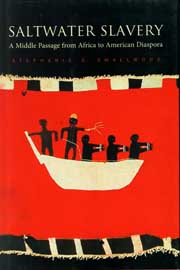2008 Frederick Douglass Prize
- Information on the Frederick Douglass Book Prize Competition
CONTACT:
Dorie Baker 203-432-8553 dorie.baker@yale.edu
Marilyn Wilkes 203-432-3413 marilyn.wilkes@yale.edu
Dana Schaffer 203-432-3339 dana.schaffer@yale.edu
Sarah Bowman 646-366-9666 bowman@gilderlehrman.org
- For Immediate Release: September 30, 2008
- University of Washington, Seattle, Professor Wins $25,000 Frederick Douglass Book Prize
-
New Haven, Conn.- Stephanie E. Smallwood, Associate Professor of History at the University of Washington, Seattle, has been selected as the winner of the 2008 Frederick Douglass Book Prize, awarded for the best book written in English on slavery or abolition. Smallwood won for her book, Saltwater Slavery: A Middle Passage from Africa to American Diaspora (Harvard University Press). The book examines the transatlantic slave trade and the relationships between Africa and the new world. The prize is awarded by Yale University’s Gilder Lehrman Center for the Study of Slavery, Resistance, and Abolition, sponsored by the Gilder Lehrman Institute of American History.

In addition to Smallwood, the other finalists for the prize were Anthony E. Kaye for Joining Places: Slave Neighborhoods in the Old South (University of North Carolina Press); Kristin Mann for Slavery and the Birth of an African City: Lagos, 1760-1900 (Indiana University Press); and Chandra Manning for What this Cruel War was Over: Soldiers, Slavery, and the Civil War (Alfred A. Knopf Publishers). The $25,000 annual award is the most generous history prize in the field. The prize will be presented to Smallwood at a dinner in New York City in February 2009.
This year’s finalists were selected from a field of over seventy five entries by a jury of scholars that included Barrymore Anthony Bogues (Brown University), Christopher Clark (University of Connecticut), and Rebecca J. Scott (University of Michigan School of Law). The winner was selected by a review committee of representatives from the Gilder Lehrman Center for the Study of Slavery, Resistance and Abolition, the Gilder Lehrman Institute of American History, and Yale University.
“Saltwater Slavery is a remarkable account of the transatlantic slave trade that will lead scholars to rethink their understanding of the middle passage, Africa’s diaspora, and the relationships between Africa and the New World,” says Clark, the 2008 Douglass Prize Jury Chair and Professor of History at the University of Connecticut. “Stephanie Smallwood uses records of the English Royal African Company’s trade with the Gold Coast to provide insights into the lives of the men and women the company bought, transported, and offered for sale in the Americas. Tracing the steps that led from captivity in Africa to final sale in the New World, Smallwood gets behind the generalities that often characterize studies of the slave trade. She shows how at each stage captives found themselves transformed and re-presented as commodities for purchase by merchants; for confinement aboard ship; and for resale as plantation workers or servants.”
“Above all, Smallwood depicts the estrangement that removed captives not only from the social and familial circles of kinship, but also from the spiritual connections with kin that could sustain a good life and a good death. Slaves built new kinship networks to save themselves from social death, but often their efforts were cut off by resale or premature mortality. Deploying slaves own metaphor of “saltwater slavery” to illuminate the meanings of the Atlantic slave system, Stephanie Smallwood opens up new avenues for historians and anthropologists to explore. This is a subtle, powerful study of the deep horrors of slavery and the slave trade.”
The Frederick Douglass Book Prize was established in 1999 to stimulate scholarship in the field of slavery and abolition by honoring outstanding books. Previous winners were Ira Berlin and Philip D. Morgan in 1999; David Eltis, 2000; David Blight, 2001; Robert Harms and John Stauffer, 2002; James F. Brooks and Seymour Drescher, 2003; Jean Fagan Yellin, 2004; Laurent Dubois, 2005; Rebecca J. Scott, 2006; and Christopher Leslie Brown, 2007.
The award is named for Frederick Douglass (1818-1895), the slave who escaped bondage to emerge as one of the great American abolitionists, reformers, writers, and orators of the 19th century.
The Gilder Lehrman Center for the Study of Slavery, Resistance and Abolition, a part of The Whitney and Betty MacMillan Center for International and Area Studies at Yale University, was launched in November 1998 through a generous donation by philanthropists Richard Gilder and Lewis Lehrman and the Gilder Lehrman Institute of American History. Its mission is to promote the study of all aspects of slavery, especially the chattel slave system and its destruction. The Center seeks to foster an improved understanding of the role of slavery, slave resistance, and abolition in the founding of the modern world by promoting interaction and exchange between scholars, teachers, and public historians through publications, educational outreach, and other programs and events. For further information on Gilder Lehrman Center events and programming, contact the center by phone (203) 432-3339, fax (203) 432-6943, or e-mail gilder.lehrman.center@yale.edu.
Founded in 1994, the Gilder Lehrman Institute of American History promotes the study and love of American history. The Institute serves teachers, students, scholars, and the general public. It helps create history-centered schools, organizes seminars and programs for educators, produces print and electronic publications and traveling exhibitions, sponsors lectures by eminent historians, and administers a History Teacher of the Year Award in every state through its partnership with Preserve America. The Institute also conducts awards including the Lincoln, Frederick Douglass, and George Washington Book Prizes, and offers fellowships for scholars to work in the Gilder Lehrman Collection. The Institute maintains two websites, www.gilderlehrman.org and the quarterly online journal www.historynow.org.
# # #
